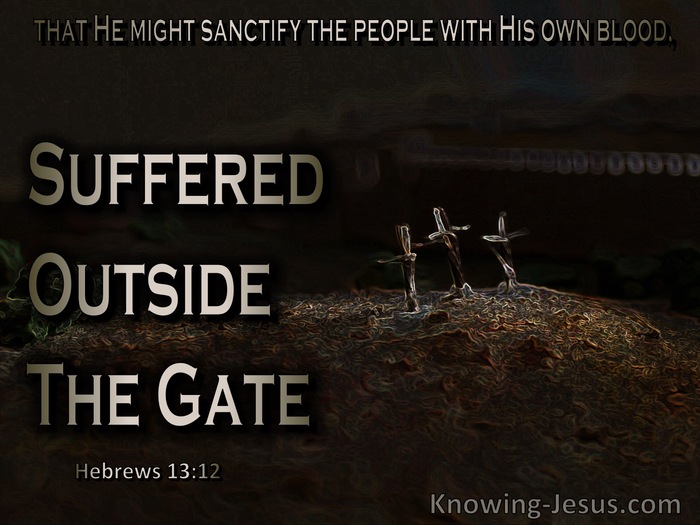4 Bible Verses about Animal Sacrifices, Sin Offering
Most Relevant Verses
For the bodies of those animals whose blood, shed for sin, is carried by the high priest into the holiest, are burned with out the camp. Wherefore, Jesus also, that he might sanctify the people by his own blood, suffered without the gate. Therefore, let us go forth to him without the camp, bearing his reproach.
Therefore, omitting the elementary Christian teaching, let us go on to the perfection of Christian instruction, not laying again the foundation of repentance from dead works, and of faith toward God, of the teaching with respect to immersions, and of the laying on of hands, of the resurrection of the dead, and of eternal condemnation. And this we will do, if God permit.read more.
For it is impossible to renew again to repentance those who have once been enlightened, and have tasted of the heavenly gift, and have been made partakers of the Holy Spirit, and have tasted the good word of God, and the powers of the coming age, if they fall away; since they again crucify in themselves the Son of God, and put him to an open shame. For the land which drinks up the rain that comes often upon it, and produces herbs suitable for those for whom it is cultivated, receives blessing from God.
Now, the first covenant also had ordinances of worship, and the worldly sanctuary: for a tabernacle was constructed, the first, in which were the candlestick, and the table, and the presence bread; and this tabernacle is called holy. But after the second vail, the tabernacle which is called the holy of holies;read more.
which had the golden censer, and the ark of the covenant overlaid on all sides with gold, in which were the golden pot that held the manna, and the rod of Aaron that budded, and the tables of the covenant; and over the ark, the cherubim of glory overshadowing the mercy-seat; of which things we can not now speak particularly. Now, when these things were thus arranged, the priests went, at all times, into the first tabernacle, discharging the service of God. But into the second, the high priest alone went, once during the year, not without blood, which he offered for himself, and for the errors of the people: the Holy Spirit signifying this, that the way into the most holy was not yet made manifest, while the first tabernacle was still standing, which, as a symbol, remains to the present time, in which are offered both gifts and sacrifices that can not make perfect, as it respects the conscience, him that does the service; since he relies only on meats and drinks and various immersions, ordinances in deed of the flesh, which were imposed till the time of reformation. But Christ, having come a high priest of the good things to come, through the greater and more perfect tabernacle, not made with hands, (that is, not of this building,) entered, not by the blood of goats and calves, but by his own blood, once for all, into the most holy, having obtained eternal redemption. For if the blood of bulls and goats, and the ashes of a heifer sprinkling the unclean, cleanses them as it respects the purity of the flesh, how much more will the blood of the Christ, who, through the eternal Spirit, offered himself without spot to God, cleanse your conscience from dead works, in order that you may serve the living God? And for this reason, he is the mediator of the new covenant: that, since his death has taken place for the redemption of transgressions that were under the former covenant, those who are called may receive the promise of the eternal inheritance. For where a testament is, it is necessary that there be brought in the death of the testator: for a testament goes into effect after men are dead: seeing that it has no validity at all while the testator lives. Wherefore, the first covenant was not instituted without blood. For when Moses had spoken to all the people every commandment of the law, lie took the blood of calves and of goats, with water and scarlet wool and hyssop, and sprinkled both the book itself and all the people, saying: This is the blood of the covenant which God enjoins on you: and, in like manner, he sprinkled with blood both the tabernacle, and all the vessels of the service.
For, whom the Lord loves, he chastens, and scourges every son that he receives. If you endure chastening, God deals with you as with sons: for what son is there whose father chastens him not? But if you are without chastisement, of which all are par takers, then are you bastards, and not sons.


